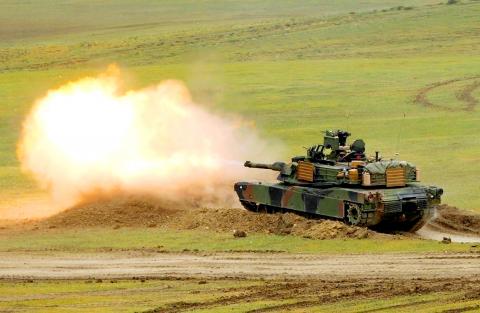The military expects to receive the first shipment of M1A2T Abrams tanks from the US by 2023, but would send personnel to the US to undergo training and accept the tanks in 2022, Minister of National Defense Yen De-fa (嚴德發) told a legislative meeting yesterday.
The Ministry of National Defense would know the exact dates when it receives the letter of offer and acceptance early next month, he said.
The Legislative Yuan last year approved a budget of NT$40.5 billion (US$1.3 billion) for 108 M1A2T tanks.

Photo: Reuters
The most recent budget submitted by the ministry showed that it plans to order 18 of the new tanks in 2022, 18 in 2023, 28 in 2024, 30 in 2025 and the remaining 14 in 2026.
At yesterday’s meeting of the legislature’s Foreign Affairs and National Defense Committee, Democratic Progressive Party Legislator Tsai Shih-ying (蔡適應) asked ministry officials about how the M1A2T compares with tanks used by Japan, South Korea, China and other countries in the region.
Army Chief of Staff Yang Hai-ming (楊海明) said that the M1A2T is more capable than South Korea’s K2 Black Panther, Japan’s Type 10 and China’s Type 99, their main battle tanks.
For amphibious assaults, China relies on lighter tanks, such as its Type 63A, which have even less firepower than the Type 99, he said.
Asked by Tsai about the M1A2T’s fuel, Yang said that it can use either aviation fuel or diesel, adding that the army is considering using diesel.
Asked whether roads in Taiwan can support the weight of the M1A2T, at more than 60 tonnes, Yang said that they could.
Additional reporting by CNA

INVESTIGATION: The case is the latest instance of a DPP figure being implicated in an espionage network accused of allegedly leaking information to Chinese intelligence Democratic Progressive Party (DPP) member Ho Jen-chieh (何仁傑) was detained and held incommunicado yesterday on suspicion of spying for China during his tenure as assistant to then-minister of foreign affairs Joseph Wu (吳釗燮). The Taipei District Prosecutors’ Office said Ho was implicated during its investigation into alleged spying activities by former Presidential Office consultant Wu Shang-yu (吳尚雨). Prosecutors said there is reason to believe Ho breached the National Security Act (國家安全法) by leaking classified Ministry of Foreign Affairs information to Chinese intelligence. Following interrogation, prosecutors petitioned the Taipei District Court to detain Ho, citing concerns over potential collusion or tampering of evidence. The

‘FORM OF PROTEST’: The German Institute Taipei said it was ‘shocked’ to see Nazi symbolism used in connection with political aims as it condemned the incident Sung Chien-liang (宋建樑), who led efforts to recall Democratic Progressive Party (DPP) Legislator Lee Kun-cheng (李坤城), was released on bail of NT$80,000 yesterday amid an outcry over a Nazi armband he wore to questioning the night before. Sung arrived at the New Taipei City District Prosecutors’ Office for questioning in a recall petition forgery case on Tuesday night wearing a red armband bearing a swastika, carrying a copy of Adolf Hitler’s Mein Kampf and giving a Nazi salute. Sung left the building at 1:15am without the armband and apparently covering the book with a coat. This is a serious international scandal and Chinese

Seventy percent of middle and elementary schools now conduct English classes entirely in English, the Ministry of Education said, as it encourages schools nationwide to adopt this practice Minister of Education (MOE) Cheng Ying-yao (鄭英耀) is scheduled to present a report on the government’s bilingual education policy to the Legislative Yuan’s Education and Culture Committee today. The report would outline strategies aimed at expanding access to education, reducing regional disparities and improving talent cultivation. Implementation of bilingual education policies has varied across local governments, occasionally drawing public criticism. For example, some schools have required teachers of non-English subjects to pass English proficiency

TRADE: The premier pledged safeguards on ‘Made in Taiwan’ labeling, anti-dumping measures and stricter export controls to strengthen its position in trade talks Products labeled “made in Taiwan” must be genuinely made in Taiwan, Premier Cho Jung-tai (卓榮泰) said yesterday, vowing to enforce strict safeguards against “origin laundering” and initiate anti-dumping investigations to prevent China dumping its products in Taiwan. Cho made the remarks in a discussion session with representatives from industries in Kaohsiung. In response to the US government’s recent announcement of “reciprocal” tariffs on its trading partners, President William Lai (賴清德) and Cho last week began a series of consultations with industry leaders nationwide to gather feedback and address concerns. Taiwanese and US officials held a videoconference on Friday evening to discuss the